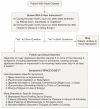Depression and cardiovascular disease: healing the broken-hearted
- PMID: 16804154
- PMCID: PMC2771193
- DOI: 10.1001/jama.295.24.2874
Depression and cardiovascular disease: healing the broken-hearted
Abstract
Major depressive disorder is a risk factor for the development of incident coronary heart disease events in healthy patients and for adverse cardiovascular outcomes in patients with established heart disease. Depression is present in 1 of 5 outpatients with coronary heart disease and in 1 of 3 outpatients with congestive heart failure, yet the majority of cases are not recognized or appropriately treated. It is not known whether treating depression improves cardiovascular outcomes, but antidepressant treatment with selective serotonin reuptake inhibitors is generally safe, alleviates depression, and improves quality of life. This article evaluates the importance of major depression in patients with cardiovascular disease, and provides practical guidance for identifying and treating this disorder.
Figures
References
-
- Murray CJ, Lopez AD. Alternative projections of mortality and disability by cause 1990-2020: Global Burden of Disease Study. Lancet. 1997;349:1498–1504. - PubMed
-
- Wells KB. Caring for Depression. Harvard University Press; Cambridge, Mass: 1996.
-
- Diagnostic and Statistical Manual of Mental Disorders. 4th ed. American Psychiatric Association; Washington, DC: 2000. Text Revision.
-
- Lett HS, Blumenthal JA, Babyak MA, et al. Depression as a risk factor for coronary artery disease: evidence, mechanisms, and treatment. Psychosom Med. 2004;66:305–315. - PubMed
-
- Stewart RA, North FM, West TM, et al. Depression and cardiovascular morbidity and mortality: cause or consequence? Eur Heart J. 2003;24:2027–2037. - PubMed



